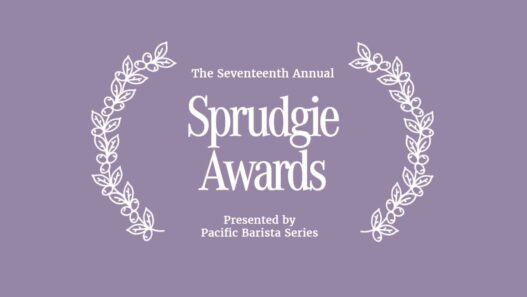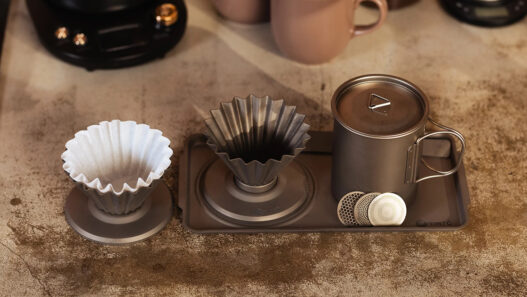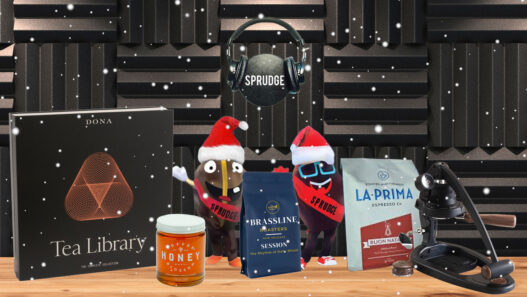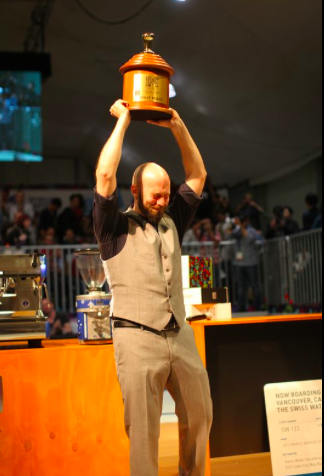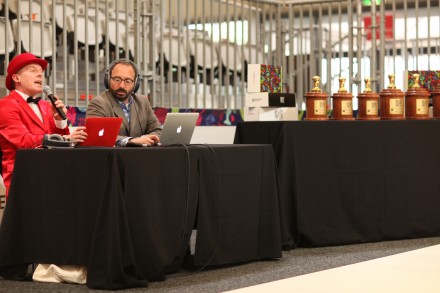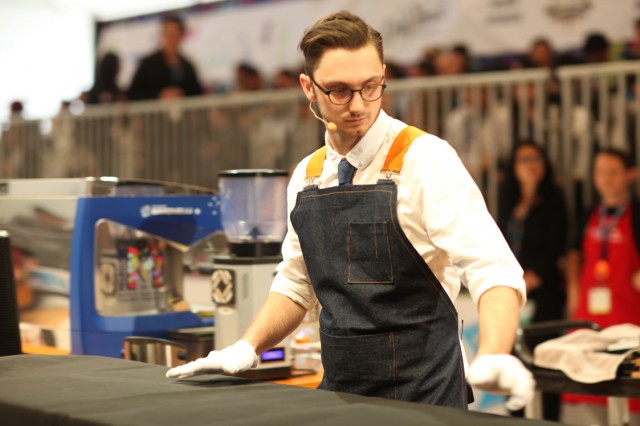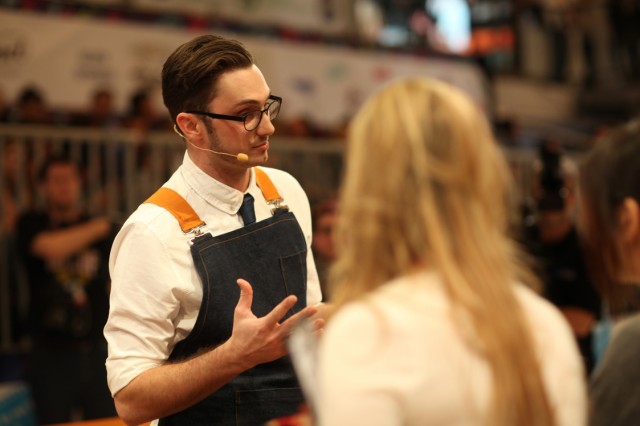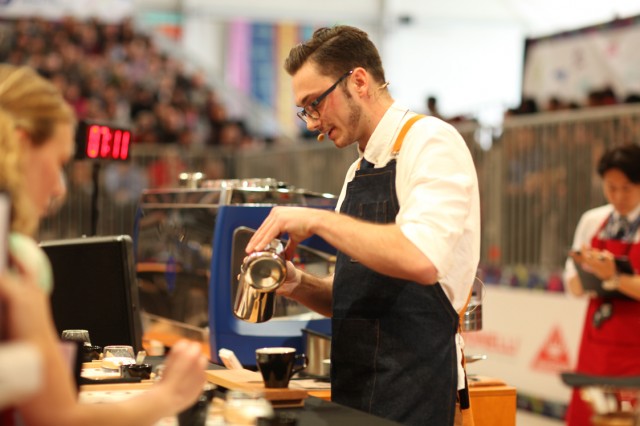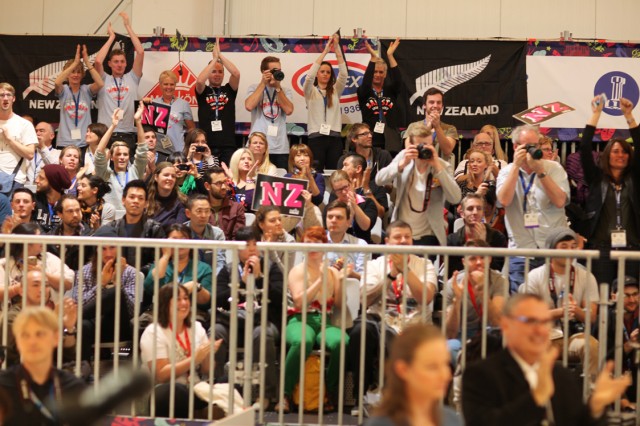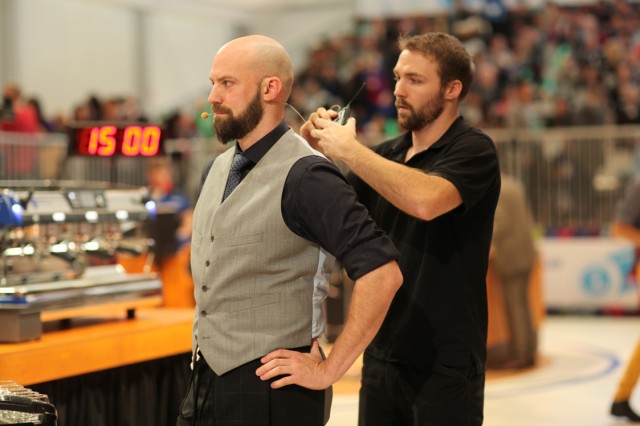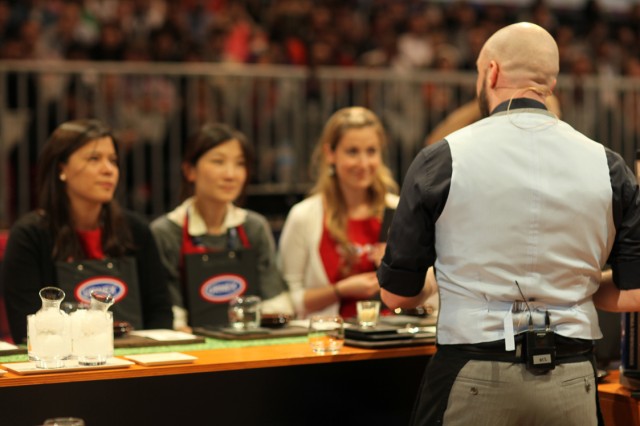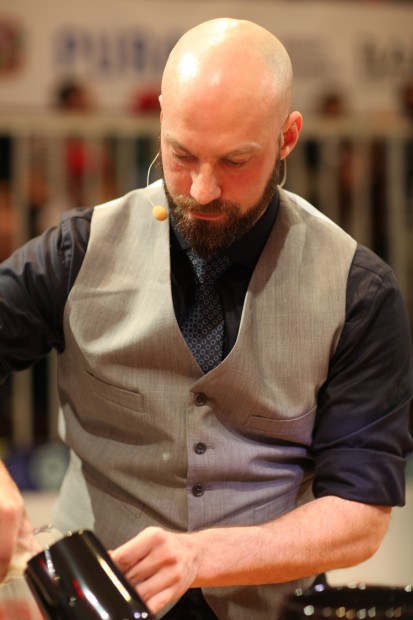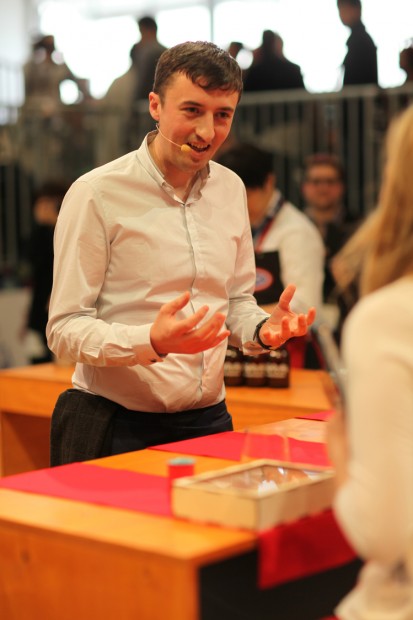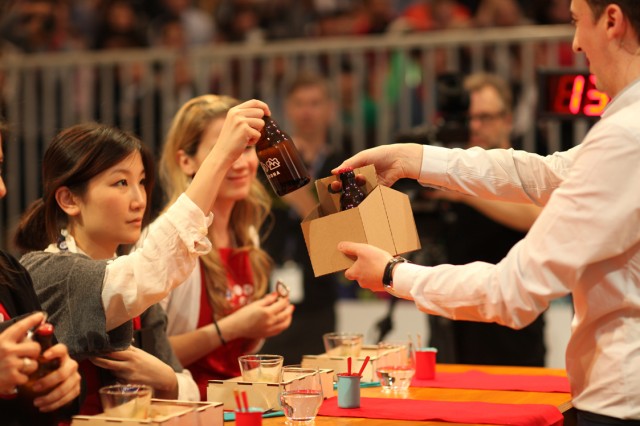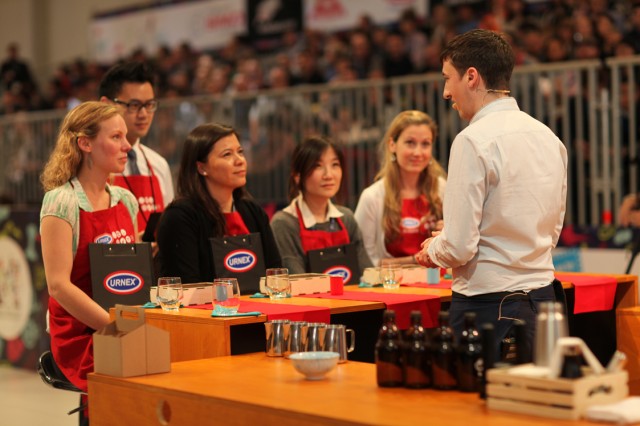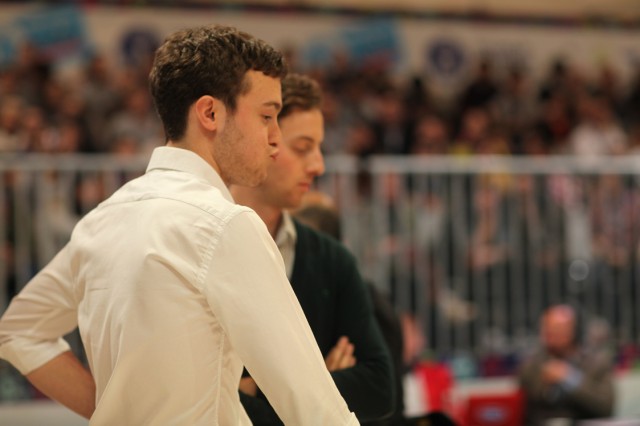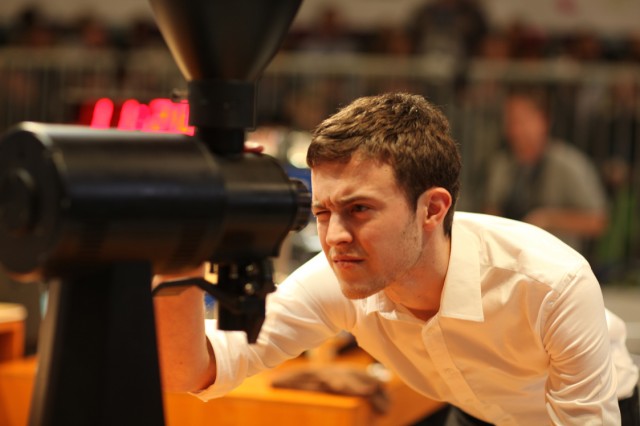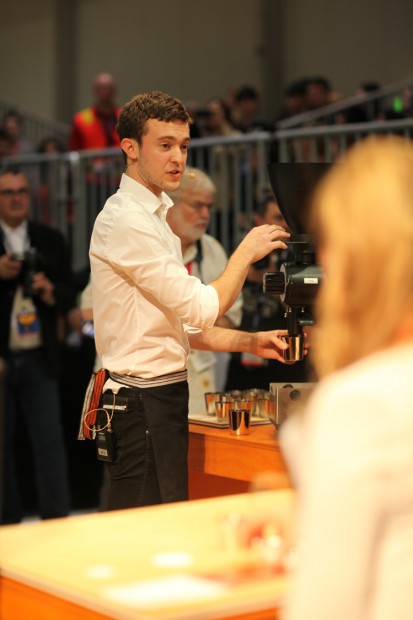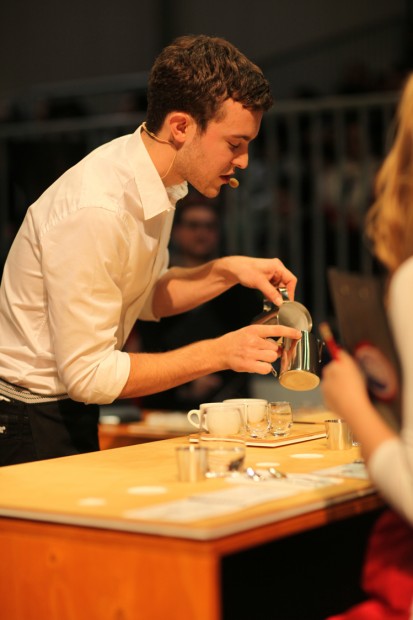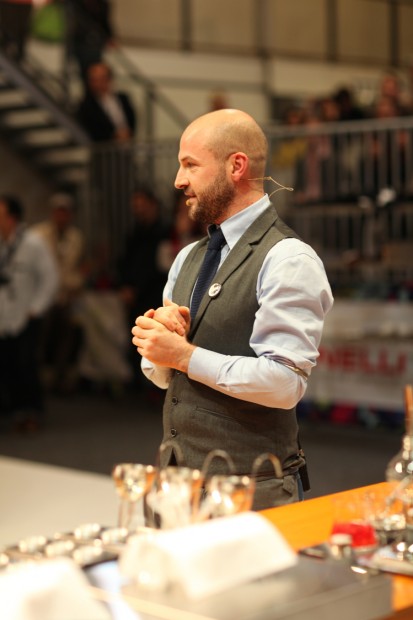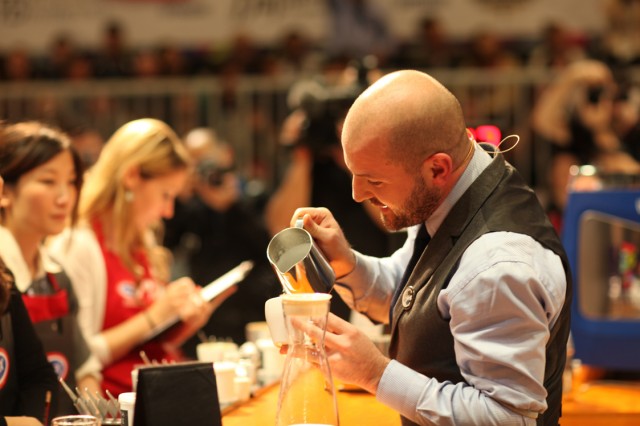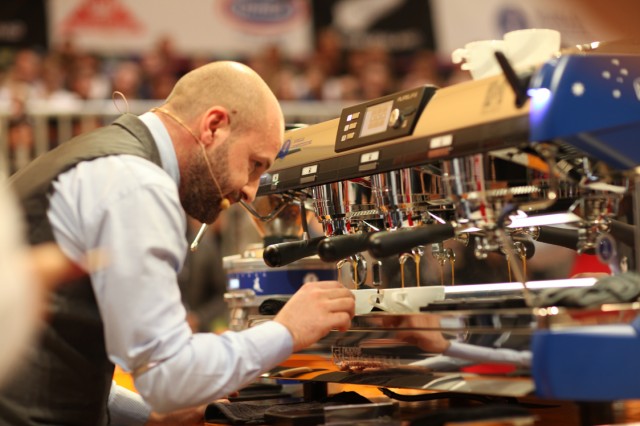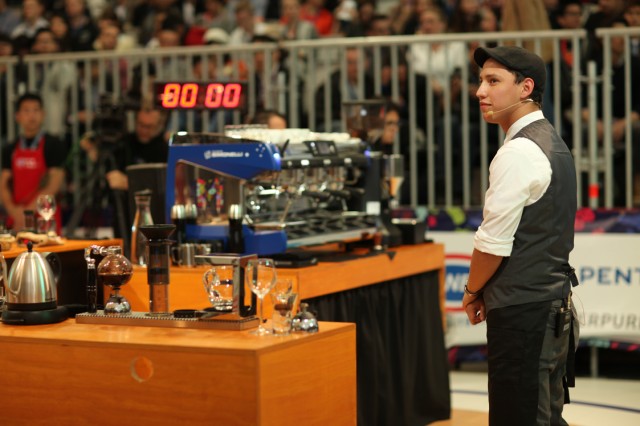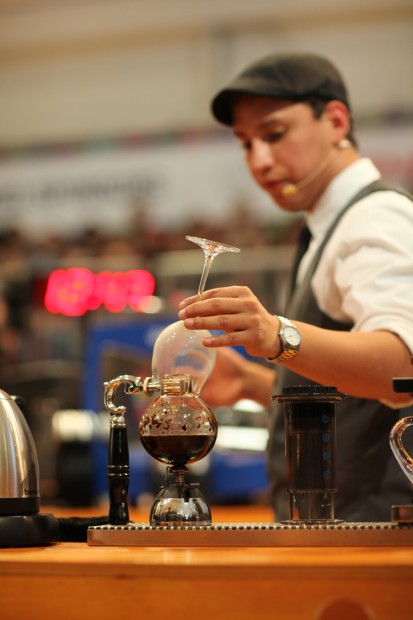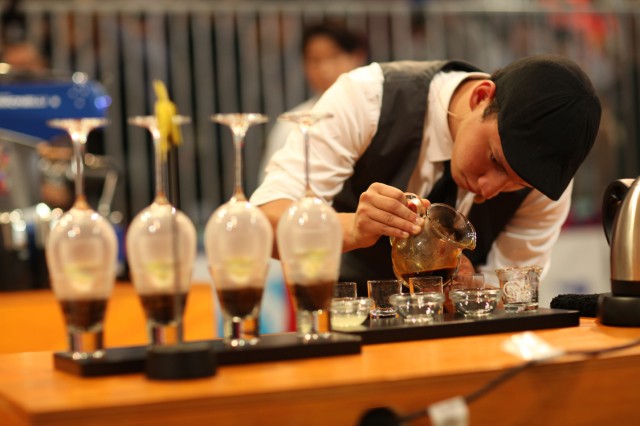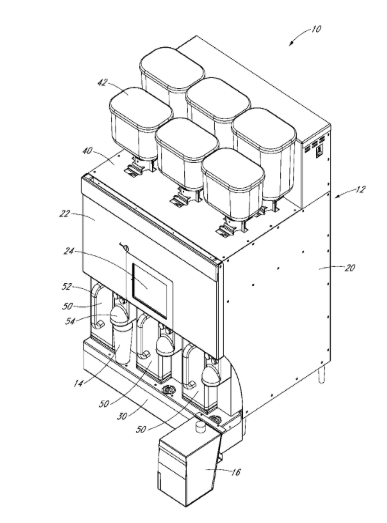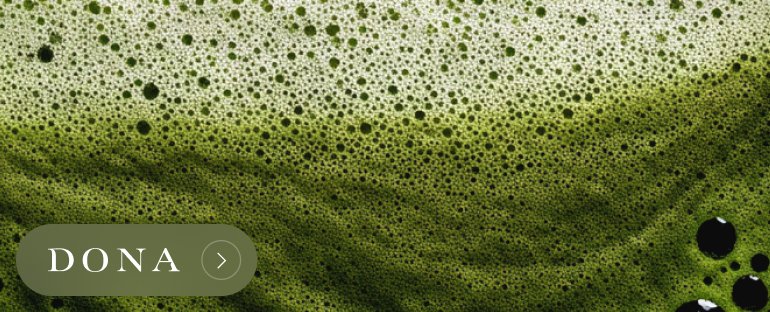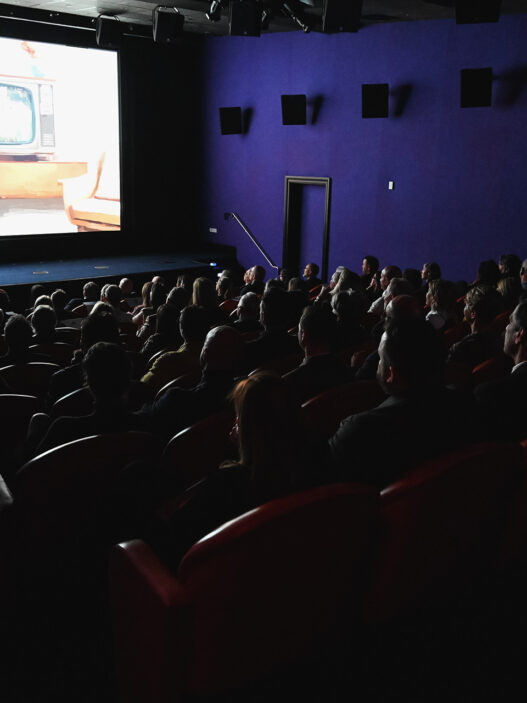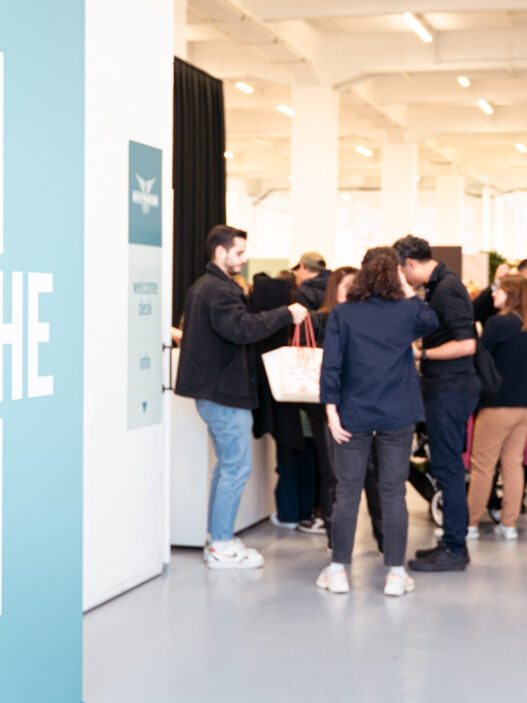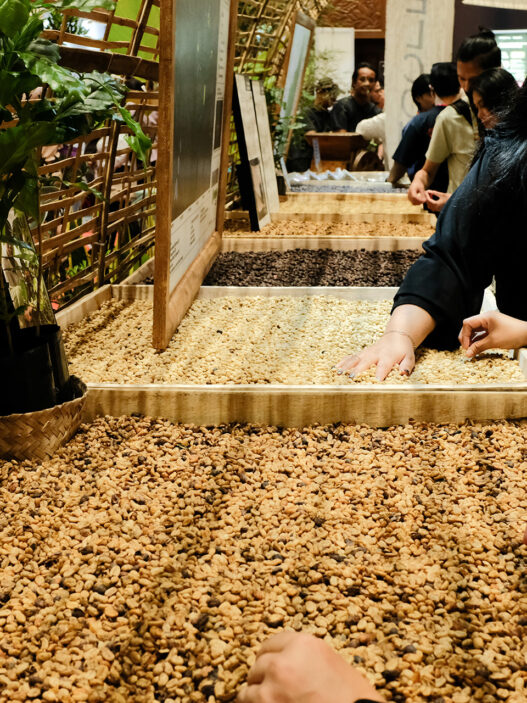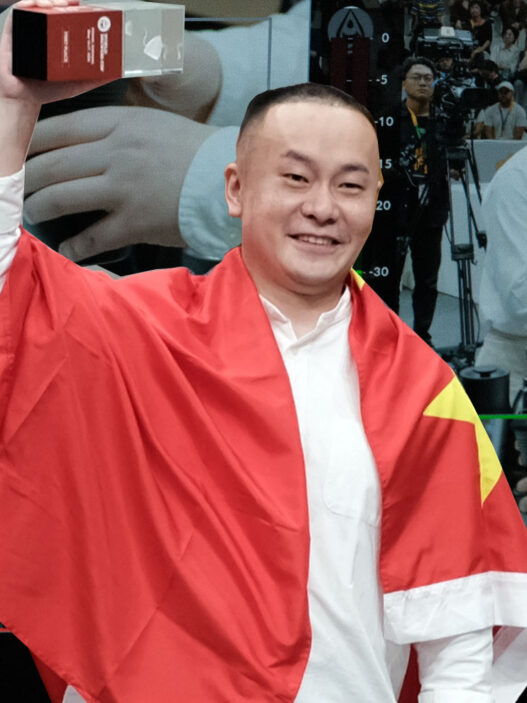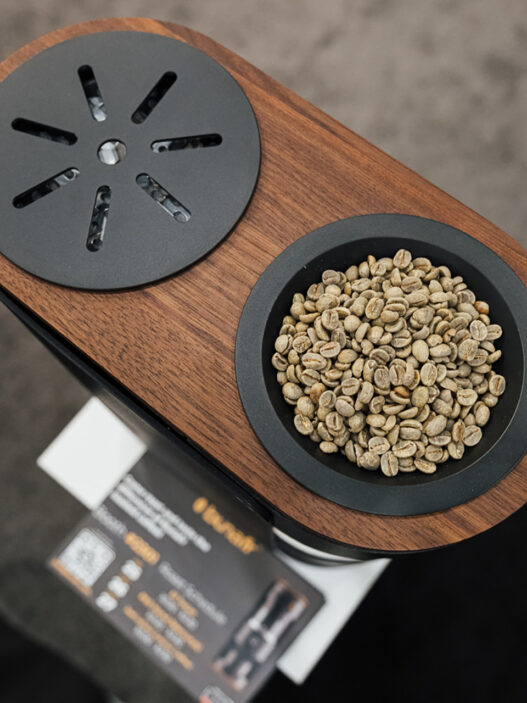From an international field of 51 competitors, these six national champions are your 2013 World Barista Championship Finalists. We wait all year long to write these essays, as they are informed by the mountain of competition watching that happens before Finals Sunday at WBC. It’s been our pleasure to serve you as Official Media Partners of World Coffee Events, and we hope to be back next year with even bigger and better coverage of the World Barista Championship.
Our coverage of the WBC was made possible by direct support from St. ALi Family in Melbourne. Sprudge.com’s WBC coverage as well as our United States regional and national coverage was underwritten by Nuova Simonelli. To both, we say a sincere thank-you for valuing our work and making this coverage possible.
Original photography for Sprudge.com by Eileen P. Kenny.
Watch every routine here via the WCE’s Hi-Res YouTube page.
Nick Clark – Flight Coffee, Wellington, New Zealand
We probably fell into a trap while covering Nick Clark in Melbourne. As others have pointed out, Sprudge has only covered the World Barista Championship since London 2010, although before that ZacharyZachary.com (a collaboration between Sprudge co-founder Zachary Carlsen and Katie Carguilo) brought the first free public livestream to WBC Japan in 2007. As a website, Sprudge missed the years when New Zealand’s Carl Sara was a dominant international competitor, fielding repeat WBC Finals appearances and helping establish his country as an international specialty coffee capital. The Kiwi coffee influence reverberates around the world; they helped plant the early seeds of specialty in Melbourne and London, and their own Wellington continues to be home to some of the best coffee buying, roasting, and presentation on the planet.
Nick Clark’s Flight Coffee is based in Wellington, where we’re of course dying to visit, sounding very much as it does like a kind of antipodal Portland: an oversized village filled with vibrant small businesses, with a noticeable influence (and expat population) in the bigger specialty coffee scenes throughout the world. The funny thing about WBC is, if you go and blow everyone away on the world stage, you bring the world to your door in terms of reputation, awareness, website clicks, you name it. Flight Coffee is a new standard bearer for this identity, and we all bore witness to that moment during the WBC. It was exhilarating to watch.
And so was Nick! Mr. Clark competed in a conversational, colloquial style that immediately connected with Your Sprudge Editors, plus countless others who buzzed about Nick’s routine from the moment he concluded his first run, during late stage dog days of Round One, Day One. Alongside WBC winner Pete Licata, Mr. Clark competed with a coffee sourced by Cafe Imports, a sun dried natural process French Mission bourbon coffee from Kenya’s Thiriku region. Dig for a moment on our transcription of Nick’s espresso tasting notes: “bright, juicy nectarine sweetness… with a dry, husky cocoa note in the finish – what I consider to be quite a lovely linger.” Lovely, indeed!
Again, we probably fell into a trap in Melbourne while covering Nick Clark, in the sense that we were guilty of thinking, quite on accident, something along the lines of “Whodathunkit? The Kiwi!” But we should have thunk it, and we sure as heck think it now: Flight Coffee and Nick Clark, from humble, sleepy Wellington, have become an international focal point for the specialty coffee world. The more things change, the more they stay the same…
Pete Licata – Parisi Coffee, KCMO, United States of America
There are World Barista Champions for whom the road to victory has been a mad dash, a sprint from the start of their careers to the moment they’re crowned king (no queens as of yet). Gwilym Davies famously decided to compete in the 2009 UK Nationals just weeks before the event; he went on to the win the Worlds that year in Atlanta. And there are World Barista Champions for whom the process has been a bit more reasonably paced; take Michael Phillips, whose 2010 WBC win was proceeded by a United States national title in 2009, all part of his natural rise up the ranks at Intelligentsia, from the stock room to the cafe floor to the world’s biggest stage, and eventually, his own company.
But then there are champions for whom the experience is more like a triathlon, a series of endurance exercises demanding different skill sets. Pete Licata fits this description. From his first time competing regionally in 2006, to his myriad regional victories leading up to his 2011 USBC win, to his achingly close 2nd place finish in Bogota in 2011, we’ve watched – and been part of the culture of watching – Mr. Licata from the very beginning of when we learned what a barista competition was. There’s a lot of jibber jabber in our live Twitter feed, a lot of ephemera, but during Pete’s WBC Finals performance in Melbourne we hit on something: “Mr. Licata is both architect and blueprint for how we in the United States understand modern competition. He’s helped build it.” And that’s just about exactly right.
In retrospect it almost seems ordained that Pete would win this year. There’s a sea change happening right now in the competition world, which is miles from being old hat or stagnant or somehow past its earlier assumed glory days. The rare air of top level specialty coffee competition is experiencing an influx of new, young talent, and its a narrative writ large. You see it region by region in the United States – young Devin Chapman’s consecutive victories in the Northwest region, Cole McBride’s enormously impressive razor thin 2nd place finish in those same NW regionals, Sam Lewontin’s commanding win this year in the Northeast, the eye-catching run by Nick Purvis in this year’s USBC Finals, the wild chemical wizardry of the competitors from Portola Coffee Lab / Theorem, and we could assuredly go on. You see it worldwide as well – Matt Perger (23 years old!) and William Hernandez (barista for just one year!) in this year’s WBC Finals, for sure, but other national champions as well, like Kalle Freese of Finland or Ryan Tan of Singapore. Look at this year’s third-place UKBC finish by Estelle Bright, who was seen closely watching the routines throughout this year’s WBC event in Melbourne, and could well be on her way to becoming the United Kingdom’s first lady champion.
These young, eminently talented competitors represent the next wave of the sport, our league, whatever you want to call it, but it wasn’t their year this year. Not yet. It makes perfect sense that 2013 would be a huge development year for those competitors we just named and many more like them, but that someone like Pete Licata would win it all. This victory was his life’s work in the most complimentary sense of the term.
It probably feels like we’ve spent this entire essay talking about people other than Pete, and that’s a compliment too. Pete’s a champion, a catalyst, a big leaguer, and he was determined and smart enough to keep working and fighting and coming back, regionally and nationally and internationally, until finally his name was the very last to be called. He did it this year with a coffee roasted by Parisi Coffee, grown in Huila, Colombia by a guy named Arnulfo Leguizamo, sourced by Cafe Imports. With his longtime friend and coach Holly Bastin by his side, Pete Licata became your rightful, hard-earned 2013 World Barista Champion, representing the United States of America and professional baristas worldwide.
Colin Harmon – 3fE, Dublin, Ireland
It’s always a special moment when Colin Harmon is on stage, and you can feel it in the crowd. The room gets a bit more green with Irish supporters, and the who’s who – the past champs, the current stars, the landed gentry – are all there to watch in advance, carefully scouring for seats before Colin presses the button. Showmanship doesn’t begin to describe it: his self-caricature cartoon in last year’s WBC Finals couldn’t possibly be topped, surely, until this year, when he thought to serve his judges a bottled four-pack of signature drink coffee stout, complete with cardboard carrier and bottle opener. He bottled and capped each beer live on stage. Every last person in the hall was smiling.
But where Mr. Harmon’s routine in the 2012 WBC was about building trust between himself and the judges, this year’s set focused squarely on specialty coffee’s progressive qualities. He competed at WBC using a washed pacamara coffee from Finca Petrona in El Salvador, yielding “cherry, milk chocolate sweetness, and green apple acidity” notes as espresso. His was undoubtedly the most memorable signature drink of WBC, a combination of malted barley, hops, water, cherries, pressed apple juice, and espresso, charged together to achieve a kind of “coffee stout” he served to the judges.
During all three of his WBC routines this year, Colin made explaining the origin of pacamara, its progressive hybridization and resistance to disease, a component part of his performance time with the judges. He repeated the statement that “For ME, El Salvador is THE progressive coffee growing country,” eliciting whoops from the Salvadorans in the audience (there to watch their own national champion, William Hernandez).
His routine was meant to be a testament to the progressive nature of specialty coffee itself, and you can follow that notion down its logical rabbit hole by asserting that Mr. Harmon himself is evidence of this progression. He returns home to Dublin, a city whose progress towards becoming a specialty coffee town owes much to Mr. Harmon’s own 3fE coffee bars, and whose developing barista community surely must see Colin as a kind of Gaelic Moses (with shorter hair). We’ll see him next at the hotly-awaited upcoming Tamper Tantrum event in Nice.
These competitions are important, but so is a bit of perspective – Colin, in so many ways, you’ve already won.
Matt Perger – St. Ali, Melbourne, Australia
No host nation has ever won the World Barista Championship. Matt Perger was not just the host nation’s champion, but a working resident of Melbourne, the host city. If you were lucky enough to be there in the crowd on Day One of the WBC, you’ll never forget the blood-curdling fervor in that competition hall, a raucous packed mad shi’douse of well-wishers and #TeamPerger partisans who stuffed the stadium to its gills and more. It sticks with us now, even after everything else we got to see that weekend, that rock concert basketball playoff atmosphere during Matt’s first run.
Matt Perger’s WBC routine will, we confidently predict, wind up being a bellweather moment in the development of new trends in specialty coffee service. There’s something to ape for everyone: the frozen espresso vessels; Matt’s bold confidence in implementing the “nutation” tamping technique; a signature beverage comprised entirely of espresso and water, pulled from the Nuova Simonelli; post-grinder particle sifting directly into the portafilter basket; and a boggling degree of intentionality w/r/t the grazing habits of two milk cows, called “Freckles” and “Blossom”, respectively. You can jump in at any moment of this routine and start learning.
And he’s a showman, too, which is worth mentioning, because this is a show after all. With all that pressure – the hometown crowd, his Brewers Cup win in 2012, the incredible promise of his still-young career – Matt Perger managed to actually have fun on stage at WBC. All three times, you could sense and see his genuine joy in being able to share his research and methodology with the judges, and by proxy, the rest of us. When you work and train for those moments as long as he has, the catharsis that comes with finally getting out there and doing it must just be tremendous.
Matt Perger was really good at WBC. Really really good. His routine was the most techincally demanding and intricate 15 minutes we witnessed covering competitions this year, and he only got better as the weekend wore on, from the roar and din of the crowd on Day One to the pin-drop hushed intensity of Finals Sunday. Where he goes now is up to him, with the rest of his 20’s splayed out before him like some grand bumpercrop of opportunity and expectation. If he chooses to keep competing, the game itself will be better for it. The thought of retaining Matt Perger as a barista competitor, and getting to see him compete again, makes us excited about our own prospects of continuing to cover these events as they happen around the world.
Francesco Sanapo – Independent, Florence, Italy
Francesco! No profile can be written about Francesco Sanapo’s 2013 WBC Finals appearance without mentioning what a wonderful, charming human being this competitor happens to be. Maybe it’s because the sport is still small, but you get to know certain folks in the course of covering it, and we know Francesco to be one of the true characters and human dynamos in the world of competitive coffee. We’ve profiled him before as the host of “Sunday At Home…A Good Coffee In My Cup!” – he is an international barista spokesman, a longtime barista competitor, and the owner of a cappuccino-loving cat.
Francesco is a great dancer of the pizzica-pizzica, the Italian dance of love. He is Italian to the core, a proud countryman who claimed himself as such during his WBC on-stage exit interview with Finals MCs Peter Giuliano and Stephen Leighton. And true to his Italian identity, Mr. Sanapo’s WBC Finals routine was a tribute to “the life of an espresso” – his was a natural processed Ethiopian coffee, the famed Nekisse sourced by Ninety Plus, which he told the judges had “an elegance and balance, with a red fruit acidity that suggests raspberries.”
There was a bit of a web kerfluffle back in 2011, when Francesco Sanapo starred in an advertising campaign for a new line of Green Mountain Coffee Roasters Keurig K-Cups. It’s not worth rehashing, but our sincere hope is that Francesco’s WBC Finals run be recognized as a respect and admiration moment for this career competitor. Mr. Sanapo is still hard at work opening the very first specialty coffee roaster and cafe in Florence; he roasted his own WBC coffee, with support from Melbourne’s Veneziano Coffee Roasters, and he’s been building out plans for this project in Florence since 2011. We wouldn’t be surprised to see him represent Italy again on the world stage, but more than that, we cannot wait to take you, our readers, to Francesco’s cafe in Florence when it opens. Stay tuned.
William Hernandez – Viva Espresso, San Salvador, El Salvador
So here’s a narrative for you: There couldn’t possibly be a third in a row WBC winner from a coffee producing country, right? Alejandro Mendez won in 2011, becoming the first-ever World Champion from a country in the coffee belt. Raul Rodas won again in 2012, representing his homeland of Guatemala – he was, like Pete Licata this year, a longtime competitor and important presence in the growth of competitive coffee as a sport / professional development exercise / whatever you want to call it. But now, in 2013, surely it must be one of the buying titan’s years, right? There couldn’t possibly be a third win in a row from a producing country?
There very nearly was, as William Hernandez of El Salbador burned brightly as one of the very best international coffee competitors in the world throughout the WBC. He shook us out of our druthers in the early morning of Day One, Round One, appearing then as the second competitor of the day. This routine had everything. For the thinking man, we saw carefully calculated aromatic experiments offered to the judges, with a signature drink and espresso course that seemed to fuse together as parts of a whole. Wine glasses suspended above espresso shots to soak up the aromatic condensation, lime peels and honey and dried cascara parchment from the very same coffee he served coloring his signature drink…it goes on and on. But for the show watcher, those in search of razzle dazzle and performance, this routine fired on those cylinders too. The delicate balancing act of wine glass atop demitasse, sure, but more than that, there were the little charming moments of Mr. Hernandez’s personality that shone through: his lilting, joyful execution of English language dialogue with the judges, the shamanistic yellow felt flower puppets that graced his stage setting, and that script! Cappuccinos with “Creamy mouthfeel, roasted almonds, and chocolate chip cookie” notes, almighty! Santa Baranza!
We are trying not to curse here on Sprudge these days – we’re a family publication – but holy smokes, there’s something special going on down there at Viva Espresso. From Alejandro Mendez in 2011, to the work done by Daniel Mendez in Vienna in 2012, to this year’s third-place WBC finish by William Hernandez, this operation has turned into a veritable dry mill of world-class talent and competition success. Did you know William Hernandez has only been making coffee for a year? Aren’t we burying the lede a bit here?
Thanks for reading and following our coverage throughout the 2013 barista competition season. We hope to be back again next year! Stay tuned!




